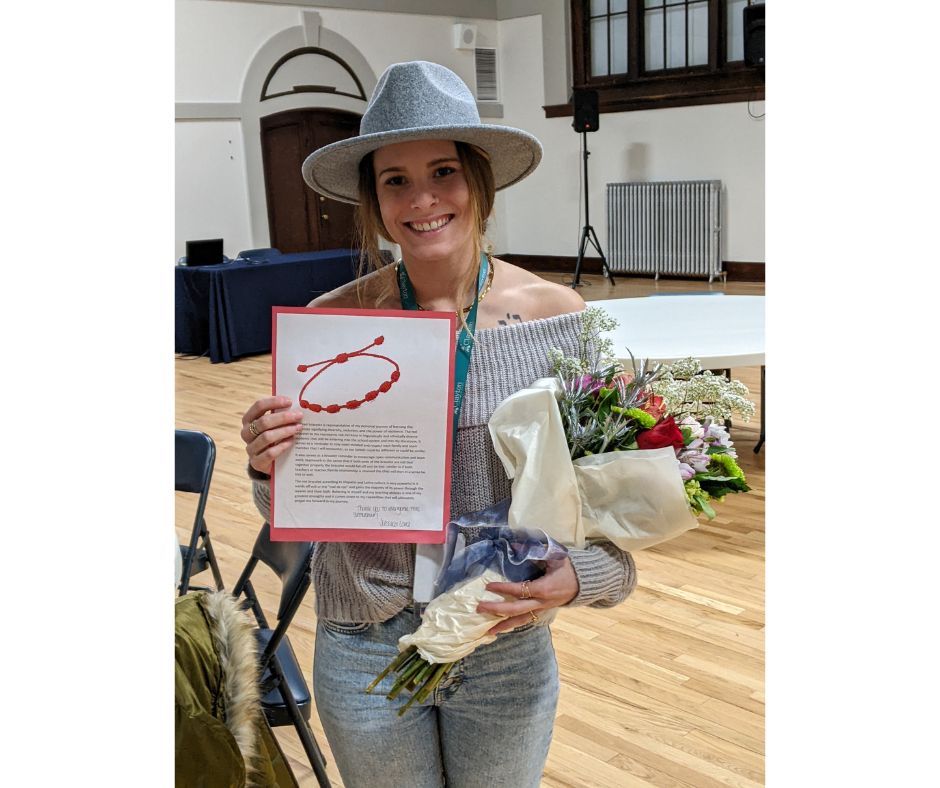
Evidence in recent years indicates that high quality early childhood education (ECE) is positively associated with teachers who have earned a college degree (Goble et al., 2015). In response, many programs, including Head Start, are beginning to require higher levels of qualifications, such as bachelor’s degrees for early childhood teachers. As a result, the higher education community has been ramping up efforts to offer teacher preparation programs in alignment with ECE professional organizations, such as the National Association for the Education of Young Children (NAEYC) to increase standards of quality care for young children (Katz et al., 2021).
ECE teachers often wish to obtain a college degree, whether or not it is required for their positions, and many report that opportunities to advance their education have led them to stay in the field for longer (Huss-Keeler, 2013). Unfortunately, many early childhood educators face a number of challenges when working towards a college degree as they often struggle to navigate a higher education system that was created with a more traditional college student in mind. Oftentimes, ECE teachers are employed full-time, vary in age and demographics, have other personal obligations like caring for families or second jobs, may be first generation college students, and may know a native language other than English (Katz et al., 2021). Systemic issues, such as the cost of a college degree, finding programs in one’s geographic area, barriers to admission or transferring credits, availability of courses after working hours, and/or lack of resources or other academic supports can all be further obstacles that ECE providers might experience (Katz et al., 2021).
One promising opportunity towards a college degree for ECE teachers is community-based teacher education. This is an alternative pathway that reduces several of the obstacles for early childhood educators inherent in many traditional teacher education programs (Katz et al., 2021). Colleges and universities are learning that it is necessary to be flexible and responsive to the unique needs of early childhood providers as non-traditional students (Sakai et al., 2014). For example, the University of Colorado at Denver created the Place-Based BA program in 2020 to specifically address many of the barriers ECE providers have reported experiencing while trying to earn their BA.
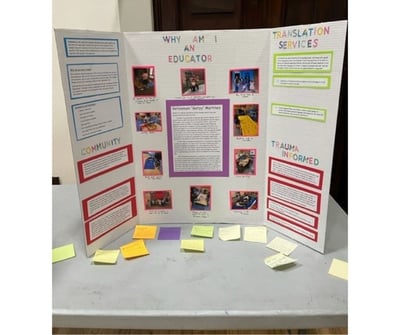
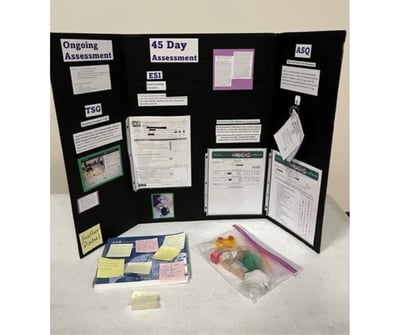
For the program, CU Denver initially partnered with three community-based early childhood centers, including Clayton Early Learning, Mile High Early Learning, and Sewell Child Development Center. Loosely based on a cohort design, 20 spots were made available to educators working within the three sites, with Clayton receiving 10 spots and the others evenly divided between Mile High and Sewell. All spots are funded by grants and scholarships, so all tuition and fees are covered for every student. In addition, an onsite coach and a CU Denver faculty member are available at each school to support program participants in their learning experiences and to assist with navigating university systems.
Once accepted into the program, “student educators” are enrolled in 2 courses per semester. ECE-specific courses are redesigned to be place-based so students can complete them in their place of employment as learning is embedded throughout their day. This means that the student educators typically do not have to travel to campus to attend classes or spend hours of personal time on coursework; instead, they work at their own pace and meet weekly or bi-weekly with their coach to discuss their learning. Moreover, learning experiences are inquiry-based and co-constructed between the student educator, the coach, and the CU Denver faculty member, which creates a highly individualized study plan that is tailored to each student educator’s specific academic and professional goals. Intensive self-reflection is integrated into the coursework as an opportunity for student educators to consider their thoughts, beliefs, values, and biases regarding early childhood education.
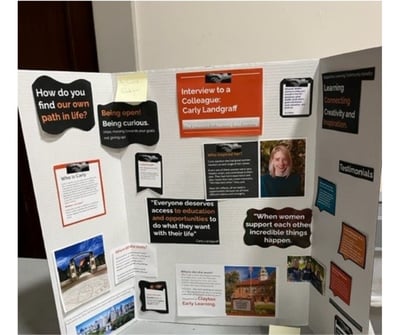
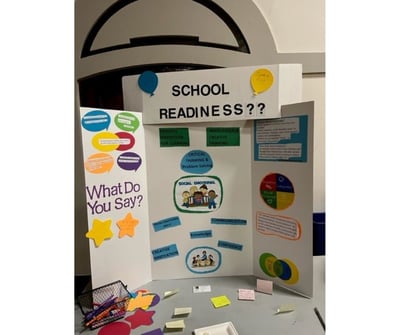
Furthermore, co-learning opportunities are offered for student educators to collaborate through online professional learning communities (PLCs) or other small group learning experiences. Participating in such intimate settings provides a chance for student educators to cultivate partnerships naturally and authentically with ECE colleagues from multiple sites, which encourages proactive perspective-taking and new and diverse ways of thinking. Also, these group experiences can foster a sense of support, belonging, and camaraderie with other early childhood providers sharing similar experiences. Finally, celebrations and opportunities to share learning are an essential aspect of the learning community, as the hard work and meaningful discoveries of the student educators are highlighted at the end of each semester.
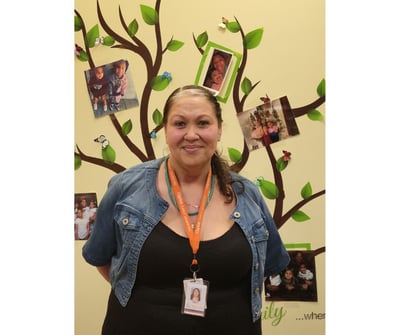
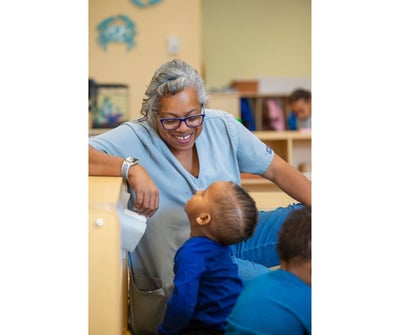
The type of learning model presented here may feel more accessible and supportive to many early childhood providers experiencing college as non-traditional students, such as longtime ECE educator, Stephany Hurst (pictured above left), who is now a lead toddler teacher at Clayton and has been working towards her BA for several years. Stephany shares, “The Place-Based program has been a wonderful and easy experience for me. I was nervous about taking classes at first, but after getting through the first semester, it really put my mind to ease. I felt no pressure and was not piled down with a lot of homework. This has been a great way to finish up my degree.” Trenna Richardson (pictured above right), another of our lead teachers at Clayton who participates in this program, further commented that, “Being part of the Bachelor program has been a true blessing for me. It has allowed me to further my education and the best part is that I can use my classroom at my place of employment and not have to go to the campus and miss time from work.”
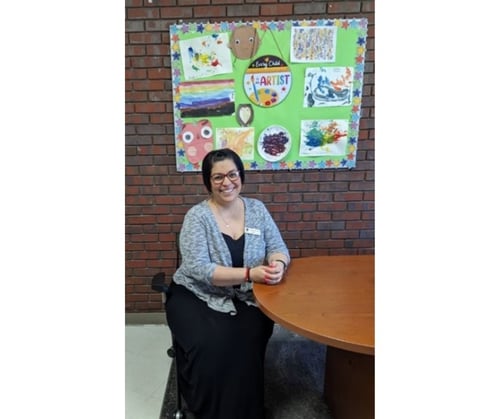
Outside of Clayton, another student educator is MonaLisa Martinez (pictured above), director of the Florence Crittenton Early Learning Center. MonaLisa, who began her career in ECE over 30 years ago, always aspired to fully complete her ECE degree, but the everyday challenges of life presented a stumbling block. That is until she found her way to the CU Denver Place-Based BA program. Because Florence Crittenton is a partner site for Clayton, MonaLisa was able to apply and be accepted into the program. “I did try to take courses here and there [over the years] in between working full-time and being a mom,” she explains, “But once the Place-Based program was introduced, it was a huge blessing. Because I knew that I would be able to finish, you know, finally!”
MonaLisa goes on to share that some of the aspects that have made the program feel so successful for her is the flexibility and support, the relevancy of the coursework to her role as a director, the connections she has made with other student educators, and of course, the cost factor. She says, “I mean, I think I've thrived in my education, the last 2 and a half years, probably a lot more than I have since I graduated from high school. I think it’s not just accomplishing and getting closer to the degree, but creating relationships along the way [gives me a lot of] support. You know, it's just a great program.” MonaLisa is now on track to complete her BA shortly.
It is becoming more and more clear that alternative teacher education pathways are essential in building a robust and well-qualified ECE workforce, not only to better professionalize the field but to increase the quality and accessibility of early childhood education for all children and families. The Place-Based BA program in partnership with CU Denver is one such community-based teacher education pathway that shows great potential in achieving these goals.









